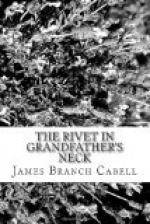Once, very long ago, some one had said that the most pathetic tragedy in life was to get nothing in particular out of it. The dying man could not now recollect, quite, who that person was.
He wondered, vaguely, what might have been the outcome if Rudolph Musgrave had whole-heartedly sought, not waited for, the great adventure; if Rudolph Musgrave had put—however irrationally—more energy and less second-thought into living; if Rudolph Musgrave had not been contented to be just a Musgrave of Matocton.... Well, it was too late now. He viewed his whole life now, in epitome, and much as you may see at night the hackneyed vista from your window leap to incisiveness under the lash of lightning. No, the life of Rudolph Musgrave had never risen to the plane of dignity, not even to that of seeming to Rudolph Musgrave a connected and really important transaction on Rudolph Musgrave’s part. Yet Lichfield, none the better for Rudolph Musgrave’s having lived, was none the worse, thank heaven! And there were younger men in Lichfield—men who did not mean to fail as Rudolph Musgrave and his fellows all had failed.... Eh, yes, what was the toast that Rudolph Musgrave drank, so long ago, to the new Lichfield which these younger men were making?
“To this new South, that has not any longer need of me or of my kind.
“To this new South! She does not gaze unwillingly, nor too complacently, upon old years, and dares concede that but with loss of manliness may any man encroach upon the heritage of a dog or of a trotting-horse, and consider the exploits of an ancestor to guarantee an innate and personal excellence.
“For to her all former glory is less a jewel than a touchstone, and with her portion of it daily she appraises her own doing, and without vain speech. And her high past she values now, in chief, as fit foundation of that edifice whereon she labors day by day, and with augmenting strokes.”
Yes, that was it. And it was true. Yet Rudolph Musgrave’s life on earth was ending now—the only life that he would ever have on earth—and it had never risen to the plane of seeming even to Rudolph Musgrave a really important transaction on Rudolph Musgrave’s part....
Then Patricia spoke. Low and very low she called to Olaf, and the dim, wistful eyes of Rudolph Musgrave lifted, and gazed full upon her standing there, and were no longer wistful. And the man made as though to rise, and could not, and his face was very glad.
For in the dying man had awakened the pulses of an old, strange, half-forgotten magic, and all his old delight in the girl who had shared in and had provoked this ancient wonder-working, together with a quite new consciousness of the inseparability of Patricia’s foibles from his existence; so that he was incuriously aware of his imbecility in not having known always that Patricia must come back some day, not as a glorious, unfamiliar angel, but unaltered.




